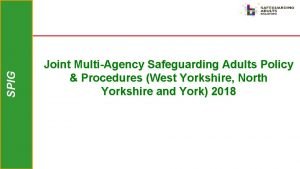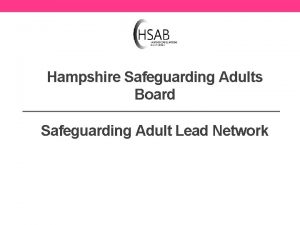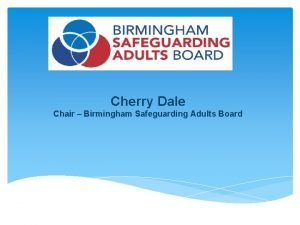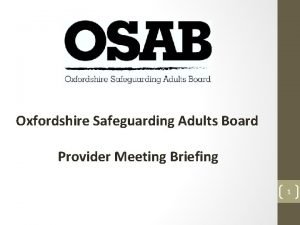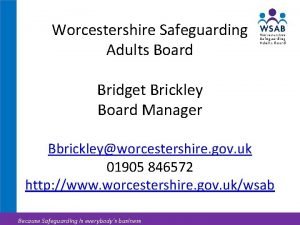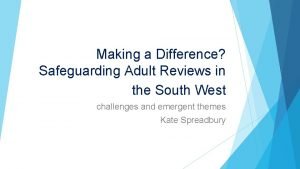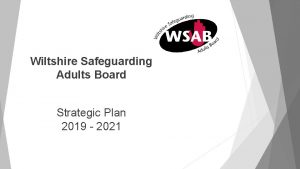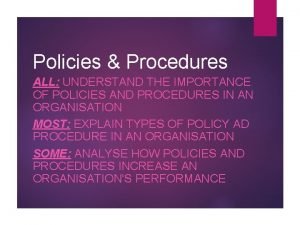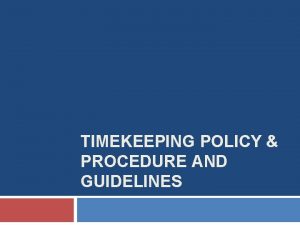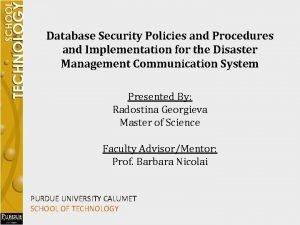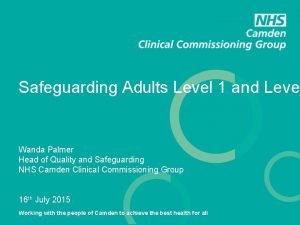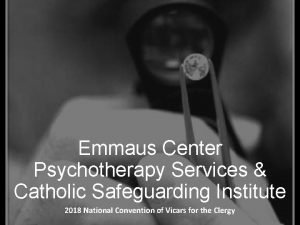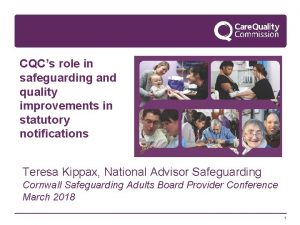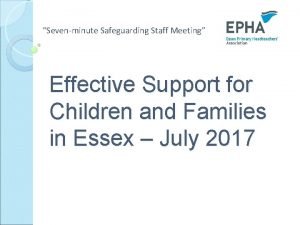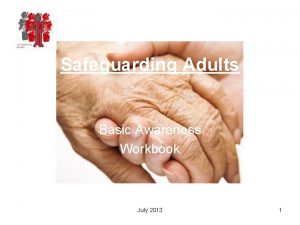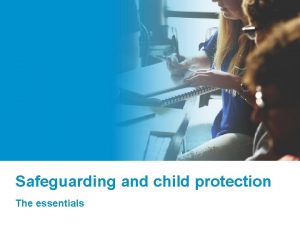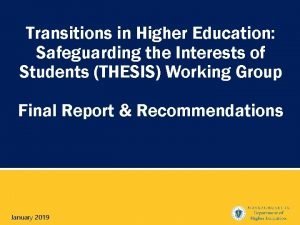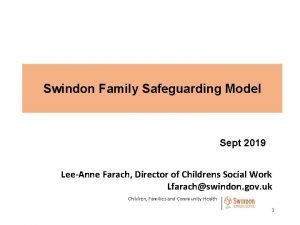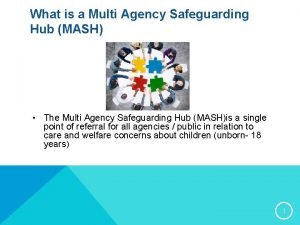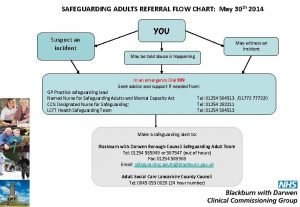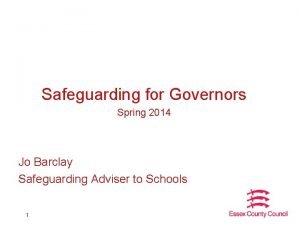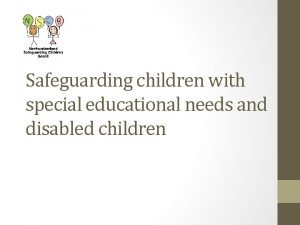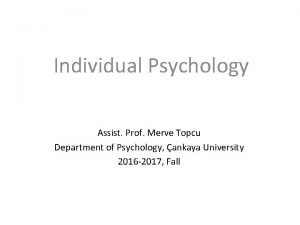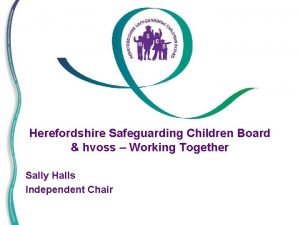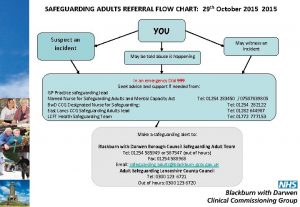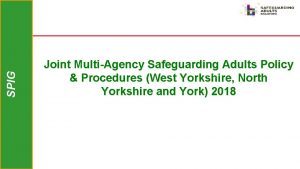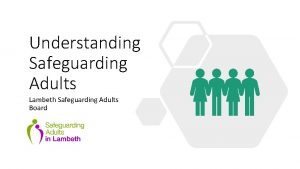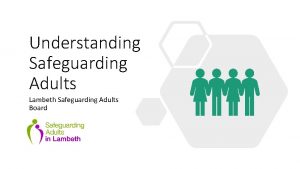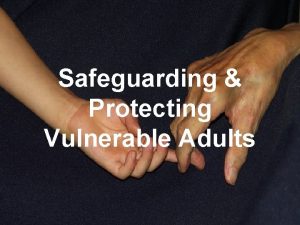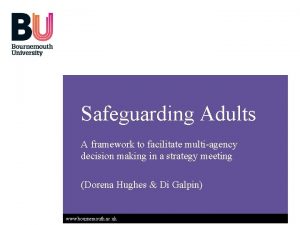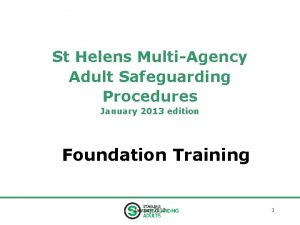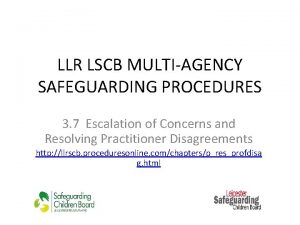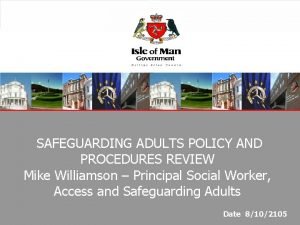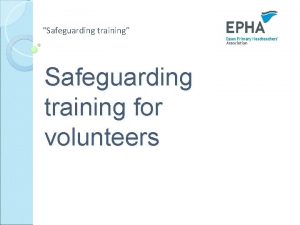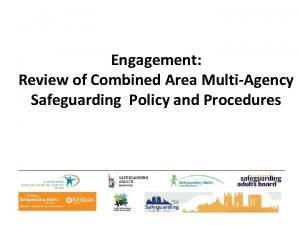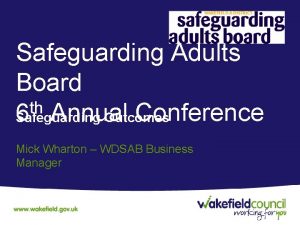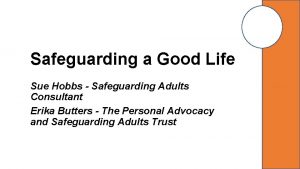SPIG Joint MultiAgency Safeguarding Adults Policy Procedures West























































- Slides: 55

SPIG Joint Multi-Agency Safeguarding Adults Policy & Procedures (West Yorkshire, North Yorkshire and York) 2018

SPIG Aims and Objectives • Overview of changes in the new policy and procedures • Understanding your role in the new policy and procedures • Understanding the Local Authorities role in the new policy and procedures • Ensure you are ready for the P&P Launch Jan 31 st 2020

SPIG Key topics for discussion • • • Safeguarding and Section 42 duties Policies and Procedures Key Changes Comparison of the old and new procedures Making Safeguarding Personal Stage by Stage review of the new policy and procedures • Stage 1 – Reporting a concern • Stage 2 – Responding to the Concern/Information Gathering • Stage 3 – Safeguarding response • Stage 4 – Outcomes and Closure

Key Changes From Jan 2020 Bradford will launch the regional Joint Multi-Agency Safeguarding Adults Policy and Procedures West Yorkshire, North Yorkshire & York SPIG A move away from process driven practice – 7 stages replaced by 4 Further Embedding of Making Safeguarding Personal (MSP) in all aspects of safeguarding procedures To update policy and strengthen ‘linked agenda’s’ New suggested timescales Removal of Designated Adults Safeguarding Manager (DASM) Replaced by Person in a Position of Trust (Pi. Po. T) (Care and Statutory Support Guidance DH 2016) The Local Authority will no longer be substantiating abuse on the ‘balance of probabilities’

SPIG Take a moment Think about what you value about your life: what makes your life better, what makes you happy, what do you like and what would you miss. This could be about e. g. • things you like to eat and drink? • things you like to do (activities)? • things to do with family or friendships (relationships)?

Making Safeguarding Personal SPIG MSP is about making sure we put the person and their wishes at the centre of any safeguarding work. Its about promoting positive risk taking and supporting people’s choice and control. It starts with a conversation about what outcomes the person wants to achieve, and what support they need to protect themselves from abuse. At the start and during any safeguarding work – Exploring the persons’ wishes, what’s important to them and what outcomes they want to achieve. At the end of any safeguarding work – Checking that the support has helped the person be safer and to achieve the safeguarding outcomes they wanted.

SPIG Key Terminology Meaning Safeguarding concern Concerns relating to an adult at risk of abuse or neglect Adult at risk This is the adult at risk and the centre of the safeguarding enquiry Person Alleged to have Caused Harm (PATCH) The person who is alleged to have caused harm to an individual – this may also be an organisation Safeguarding Concerns Manager The person with safeguarding responsibilities within an organisation who reported a safeguarding concern to the Local Authority (formerly Responder) Safeguarding Coordinator The Safeguarding Coordinator manages the oversight safeguarding concern within the Local Authority Enquiry There are 2 types of safeguarding enquiry, either: - Section 42 criteria - Safeguarding Other – Non – statutory enquiry

Terminology Meaning Enquiry Officer The person who is responsible for undertaking enquiries on the behalf of the Local Authority SPIG Key Terminology Planning Discussion This may be a face to face, telephone with Enquiry Officer, person and/or their representative/advocate which is an informal response. Planning Meeting This is a multi-agency meeting which is chaired by the Safeguarding Co-ordinator for the relevant locality team Safeguarding Plan This includes: • Steps to assure future safety • Provision of any support, treatment or therapy (including on-going advocacy) • Modifications to service provision • Support required through any action to seek justice or redress • Any steps that the person can take to keep themselves safe

The Policy and Procedures SPIG • Split into two sections • Policy section • Procedures section • Appendix at the end of the policy

Safeguarding and the Care Act 2014 SPIG Safeguarding means protecting an adult’s right to live in safety, free from abuse and neglect. 6 key principles underpin all adult safeguarding work: • Empowerment • Prevention • Proportionality • Protection • Partnership • Accountability

Organisations SPIG In order to be ready for the launch of the Policy and Procedures • Each organisation should have reviewed and updated their safeguarding adults policies and procedures (where required) These should: • Reflect the Joint Safeguarding Adults Multi-Agency Policy and Procedures (West Yorkshire, North Yorkshire and York)

SPIG Safeguarding Procedure Stage comparison

SPIG Safeguarding Procedures

SPIG Safeguarding customer journey

Stage One – Reporting a Concern SPIG "tell us your concern"

Overview: Stage 1 – Reporting a Concern SPIG Ask the person what they want to achieve through safeguarding (Making Safeguarding Personal) Consider Consent and Mental Capacity Record issues and actions taken to reduce risk Raise a concern within 24 hours

Managing Safeguarding Concerns flowchart • Immediate risk to a person with care and support needs and/or others SPIG • What does the person want to happen? • Confidentiality? • Being honest and clear about the action you are going to take and why • Consider if a crime needs to be reported and you have the adults consent to do so • Record all conversations and actions taken • Refer to flowchart B when deciding whether to report a Safeguarding concern

Key questions when deciding whether to report a Safeguarding Concern • Mental Capacity SPIG • Consider whistleblowing procedures • Public and Vital interests • Refer a concern to the local authority is required if abuse is known or suspected • Contact your Safeguarding Concerns Manager

SPIG Categories of abuse under the Care Act • • • Discriminatory Abuse Domestic Abuse Financial and Material Abuse Modern Slavery Neglect and Acts of Omission Organisational Abuse Physical Abuse Psychological Abuse Self-Neglect Sexual Abuse

SPIG Putting the person at the centre of the concern • Making Safeguarding Personal (MSP) starts before the concern is raised with the local authority • Organisations should ensure their procedures: – Help the person to realise the outcome(s) based on their views and wishes – Listen to what outcome they would like to achieve and what would help them feel ‘safer’ now – Having proportionate risk appraisal which includes positive risk assessment to support the person to achieve the person’s outcome – Any safety measures taken should be shared with the Local Authority when you report the concern

Decision Making Flowchart All adults should be presumed to have capacity unless proven otherwise. If the person is able, consent must be obtained by the person undertaking the procedure • Has there been a change in how the person is acting? • Is it different to how they would normally behave? • Has the person been assessed as lacking capacity to make other decisions? • Has someone else questioned the person’s capacity? The person will be able to decide No A diagnosis alone is not enough to warrant a capacity assessment! o Yes SPIG ARE THERE GROUNDS TO ASSESS CAPACITY? Conduct the two-stage capacity test Is the person unable to make the decision because of their mental impairment? N Yes Refer to the Mental Capacity Act (2005) best interest decision making Refer to the five principles of the MCA: Assume a person has capacity Support the individual to make their own decision An unwise decision does not mean the individual is incapacitous Always act, or decide, for a person without capacity in their best interests Choose the least restrictive option

SPIG Provider Duties Where a member of staff or volunteer is alleged to have caused harm to an adult at risk, the organisation should: – Take appropriate action to ensure the safety and wellbeing of the adult at risk – Consider informing the police if a crime is suspected – Report as a safeguarding concern to the local authority – Support both the adult at risk and the member of staff – Follow their procedures for managing allegations against staff – Follow their Incident / disciplinary investigation procedures, – Consider measures necessary to protect individuals and the integrity of any enquiries (e. g. suspension or re-assignment of duties as a neutral act pending enquiries) – Inform regulators and commissioners – Support and protect any witnesses The adult should always be involved from the beginning of the enquiry unless there are exceptional circumstances that would increase the risk of abuse.

SPIG Reporting a concern • If the person you are concerned about is not in immediate danger, you should report the concern to the Local Authority via the Multi-Agency Safeguarding Hub • You can contact the MASH team through our online form or by telephone on 01274 431077 • Monday to Thursday: 8. 30 am to 5 pm Friday: 8. 30 am to 4. 30 pm • Outside of opening hours: The MASH will not screen concerns Out of Hours. This is handed over to the Emergency Duty Team (EDT)

"toget her we will consid er how best to help you" Stage Two – Responding to a concern/information gathering SPIG “Together we will consider how best to help you”

Section 42(1) criteria SPIG When the Local Authority has Reasonable Cause to Suspect: i. Has needs for care and support (whether or not the authority is meeting any of those needs), ii. Is experiencing, or is at risk of, abuse or neglect, and iii. As a result of those needs; is unable to protect himself or herself against the abuse or neglect or the risk of it 3 Stage Test is Met

Information Gathering to inform decision making SPIG • Information gathering is done under the S. 42(1) duty and if the criteria is met then the enquiry and decision on what action to take (including no action at all is followed under the duty to make enquiries described in S. 42(2) • The Local Authority MUST • iv. make (or cause to be made) whatever enquiries it thinks necessary to enable it to decide • v. whether any action should be taken in the adult’s case and, if so, what and by whom. This includes whether this would be a lawful interference in someone's private life (Human Rights Act, 1998)

SPIG Non Statutory Safeguarding Enquiries Local authorities are not required by law to carry out safeguarding enquiries on behalf of adults who do not fit the criteria outlined in Section 42 of the Care Act 2014; they do so at their own discretion.

SPIG Receiving a Concern • Safeguarding concerns will be received within the Multi-Agency Safeguarding Hub (MASH) • The concern will be triaged the day it is received • The person referring the concern will be contacted where: – Where there is a need to clarify points raised in the concern and what actions have been taken to manage risk, or – Additional information is required, or – To establish if an additional/alternative service is required. – There is a need to verify if there is consent to share personal information.

Enquiries – Throughout all Stages SPIG Local Authority Responsibilities: • • What type of enquiry is appropriate and proportionate Who should lead and who should contribute Links to other procedures and processes Collating information, reports and delegated enquiries from various sources Actions for the adult Actions for the person alleged to have caused harm Actions for the organisation Provider Responsibilities: • • • Carrying out employment & disciplinary procedures Investigating incidents Implementing safety measures for the Adult at Risk – Prevent reoccurring risk & risk to others • Assuring regulators and commissioners

MASH process SPIG • When a concern is received by the MASH If S. 42 is met the case is allocated to an Enquiry Officer within the LA • The Enquiry Officer is responsible for: – Initial information gathering – Meet immediate safety within 24 hours – Make a decision on whether to proceed or exit • If S. 42 is not met: – Request for a Care Act assessment – Provide information, advice and guidance – Signpost to another agency – No further action

Timescales Goodhart’s Law SPIG When a measure becomes a target, it ceases to be a good measure Campbell’s Law The more any quantitative indicator is used for social decision making the more subject it will be to corruption pressures and the more apt it will be to distort and corrupt the social processes it is intended to monitor Timescales are desirable and NOT Key Performance Indicators

Bradford District Adult Multi-agency safeguarding Hub (MASH) Britannia House, Bradford

Stage 2 – Responding to a concern • Daily report generated • Research conducted • MASH discussion • Decisions reached

Stage 2 – MASH Response Dealing with today’s business today • Police v Crime / Log / AAR / Intelligence / Joint Visit / Specialist Department /No Police Role

What is an Investigation? An investigation is an effective search for material to bring an offender to justice.

The Golden Hour “ The period immediately following the commission of an offence when material is abundant and readily available to the police. Memories are at their freshest and suspects are at their most vulnerable and lies are most easily identified. ” Core investigative doctrine 2012

Accounts : REMEMBER • Accounts from different witnesses need to be taken separately. They should not confer or be allowed to come up with composite / identical descriptions. • You must include what the witness / victim says. Even if you don’t think what they are saying is right!

STAGE 3 – SAFEGUARDING RESPONSE SPIG “We will take agreed action to support you to be safe”

SPIG Safeguarding Response • Where the concern cannot quickly and proportionately be ended, the Section 42 duty continues. • All enquiries require some degree of planning • This can range from a conversation between the Enquiry Officer and the person and/or their representative/advocate (Planning Discussion) or through to a multi-agency meeting (Planning Meeting) • Planning helps to determine roles and plan actions required to manage risk in the best way possible and to review appropriately

SPIG Safeguarding Response – Key Activities • • • Planning Meeting and/or Discussion Undertake the Enquiry Risk Assessment Agree Safeguarding Plan Explore Recovery & Resilience

SPIG Planning Discussions and Meetings • Discussions & Meetings to consider: – Current Risk Assessment – The person’s views and wishes (MSP) – Person’s Mental Capacity – Views of others – Actions and action owners – Delegated Enquiries – Links to other procedures – Safeguarding Plan – Keeping the person updated – Keeping the person alleged to have caused harm updated (if relevant) – Further meetings • Discussion with the adult at risk on outcomes and safeguarding response should be done within 10 working days from the Initial Enquiry decision

Safeguarding & the delegated enquiry officer SPIG • What is a delegated enquiry officer? “A delegated enquiry officer is a member of another agency undertaking the enquiry on the local authority’s behalf” They may be involved in: • • • Information collection Implementing measures to reduce risk Completing their normal expected duties in safeguarding and other activities The link between the HR processes in their own organisation and safeguarding Sharing their professional opinion, skills and knowledge in regards to safeguarding

Requesting a delegated enquiry • When an enquiry has progressed to Stage 3 of the procedures: SPIG • The Local Authority must agree a delegated enquiry with another organisation. A delegated enquiry form will be completed and sent to the delegated officer • A TOR should be agreed and a summary of safeguarding concerns • The LA will always be Lead Enquiry Officer and retain responsibility for the safeguarding concern and decision making • The Lead enquiry officer will always support the Adult At Risk with the Safeguarding and apply the principles of making safeguarding personal. • The Lead enquiry officer should always keep you informed, sharing relevant and necessary information.

SPIG Linking different types of enquiries • A number of different types of ‘enquiries’ exist e. g. Police, OPG, CQC, Serious Incidents • These can range from single to multi-agency • Where multiple enquiries are undertaken the Local Authority will co-ordinate and collate relevant information • The relevant information from these enquiries will inform the Enquiry Report and LA decision making In not all circumstances will it be relevant to wait for the conclusion of all other enquiries

SPIG Safeguarding Plan • • • It is person centred and outcome focussed It is always done in conjunction with the Adult at Risk or their advocate It is a strengths based approach to recovery and resilience Identifies the overall goal and what the person wants to happen Eco-map of support networks • It is not a Care and Support Plan

SPIG Stage 4 – Outcomes & Closure inc. Safeguarding Plan & Review

Stage 4: Outcomes & Closure SPIG Every Safeguarding concern which progresses to safeguarding response will have an outcome and closure response • This can range from a discussion to a Multi-Agency Meeting or a range of activities which may include telephone or face to face conversations to ensure: 1. The LA has met it’s S. 42 duty to enquire into the Safeguarding Concerns 2. Have the Outcomes of the Adult at Risk been met? (Where possible) • If the S. 42 duty is fulfilled the safeguarding will exit, if there is a need to continue monitoring and reviewing the S. 42 duty continues

SPIG Outcomes and Closure Key Activities • Agreement with the Adult at Risk to close safeguarding • Any referrals for additional support, advice and information is provided • All organisations involved in the enquiry process are updated and informed • Evaluation of Safeguarding by the Adult at Risk (MSP) If the S. 42 duty continues, reviewing and monitoring of safeguarding continues and consideration is given to: • The remaining level of risk to the adult • Whether the Safeguarding plan needs updated • What actions are required and by whom To complete within 12 weeks of the reporting of the concern

SPIG Closing Safeguarding • Safeguarding Enquiries can exit when: ü The safeguarding process is no longer required ü The Safeguarding Plan is no longer required ü When the adult is no longer at risk of abuse or neglect, or risk has reduced to the level that they can adequately and appropriately be managed or monitored through assessment and support planning processes ü A person with capacity who has care and support needs removes consent and there are no overriding public or vital interest considerations • Where criminal enquiry is likely be a long time before it is concluded, it is good practice to keep the safeguarding enquiry open the criminal enquiry has concluded. This will enable the person to consider their outcomes fully, which may include recourse to restorative justice. • Where criminal enquiries are on-going there may be a need to be a re-referral to the advocacy service to support the person

Review SPIG • A review of Safeguarding may be required where: – Risk is on-going which requires monitoring – The Adult at Risk has not agreed to the closure of safeguarding and their outcomes are achievable • The purpose of the review is to: – Evaluate risk – Evaluate the effectiveness of the safeguarding plan • Safeguarding Plans should be: - Written in conjunction with the Adult at Risk • Decisions - Whether the safeguarding plan is no longer required or needs to continue - Review timescales & Effectiveness

Making Safeguarding Personal Questionnaire SPIG WHOEVER IS MANAGING THE SAFEGUARDING EPISODE WILL COMPLETE THE MSP QUESTIONNAIRE WITH THE PERSON OR THEIR REPRESENTATIVE/ADVOCATE Was the individual or individual's representative asked what their desired outcomes were? If outcomes were expressed, did the person or their representative feel that the desired outcomes were achieved? To what extent was the individual or individual's representative involved in understanding and responding to acceptable levels of risk?

SPIG Making Safeguarding Personal • Keeping the person and their wishes and desired outcome at the centre of any safeguarding enquiry • When raising a concern, ask the person what outcome they would like to achieve through safeguarding or what would help them feel ‘safer’ • Promoting positive risk taking and supporting people’s choice and control • Support people who lack capacity to make their own decisions with the least restrictive option • Seeking to enable people to resolve their circumstances, recover from abuse or neglect and realise the outcomes that matter to them in their life

Making Safeguarding Personal SPIG AT THE END OF THE ENQUIRY THE PERSON SHOULD BE ABLE TO SAY…. The people I wanted were involved I had good quality care I was helped to manage the risks I felt safe and in control People understood me and recognised what I could do I had the information I needed in the way I needed it People worked together reducing risk to my safety and well-being

Bradford Safeguarding Adults Board SPIG Following the 31 st Jan 2020 All Resources will be made available through the http: //editsb. bradford. gov. uk/

SPIG Questions ? ? ?
 Spig meaning
Spig meaning Unit 11 safeguarding adults and promoting independence
Unit 11 safeguarding adults and promoting independence West hampshire pes referral hub
West hampshire pes referral hub Portsmouth safeguarding
Portsmouth safeguarding Birmingham safeguarding adults board
Birmingham safeguarding adults board Oxfordshire safeguarding adults board
Oxfordshire safeguarding adults board Worcestershire safeguarding adults board
Worcestershire safeguarding adults board Somerset safeguarding adults board
Somerset safeguarding adults board Wiltshire safeguarding board
Wiltshire safeguarding board Wales safeguarding procedures
Wales safeguarding procedures Importance of policy
Importance of policy Timekeeping policy and procedures
Timekeeping policy and procedures Database security policies
Database security policies Waar ligt noord oost zuid west
Waar ligt noord oost zuid west East south east wind direction
East south east wind direction East is east and west is west
East is east and west is west Name of the wind series
Name of the wind series Old west vs new west
Old west vs new west Lamb carcass grading
Lamb carcass grading Superior costotransverse ligament
Superior costotransverse ligament Condyloid ellipsoidal joint
Condyloid ellipsoidal joint Temporary wood joints
Temporary wood joints Appretaite
Appretaite Cutability
Cutability 6 principles of safeguarding
6 principles of safeguarding Catholic safeguarding institute
Catholic safeguarding institute Cqc notifications safeguarding
Cqc notifications safeguarding Essex infolink safeguarding
Essex infolink safeguarding 7 minute safeguarding briefings essex
7 minute safeguarding briefings essex Child safeguarding standards
Child safeguarding standards John lives
John lives Safeguarding and child protection the essentials
Safeguarding and child protection the essentials Safeguarding in higher education
Safeguarding in higher education Andrew hall safeguarding pro
Andrew hall safeguarding pro Jo barclay essex safeguarding
Jo barclay essex safeguarding Family safeguarding model hertfordshire
Family safeguarding model hertfordshire Andrew hall safeguarding pro
Andrew hall safeguarding pro Elaine cass
Elaine cass Herefordshire social services safeguarding
Herefordshire social services safeguarding Safeguarding is everyone's business
Safeguarding is everyone's business Social services mash referral
Social services mash referral Northamptonshire safeguarding children's board
Northamptonshire safeguarding children's board Safeguarding referral flowchart
Safeguarding referral flowchart 6 principles of safeguarding
6 principles of safeguarding What is the toxic trio
What is the toxic trio Jo barclay
Jo barclay Safeguarding special needs
Safeguarding special needs Pampered style of life
Pampered style of life Safeguarding is everyone's responsibility
Safeguarding is everyone's responsibility Safeguarding children care certificate
Safeguarding children care certificate Herefordshire safeguarding board
Herefordshire safeguarding board Think family safeguarding
Think family safeguarding Ted safeguarding poster
Ted safeguarding poster Safeguarding referral flowchart
Safeguarding referral flowchart Mash referral london
Mash referral london Wonnacott discrepancy matrix
Wonnacott discrepancy matrix
